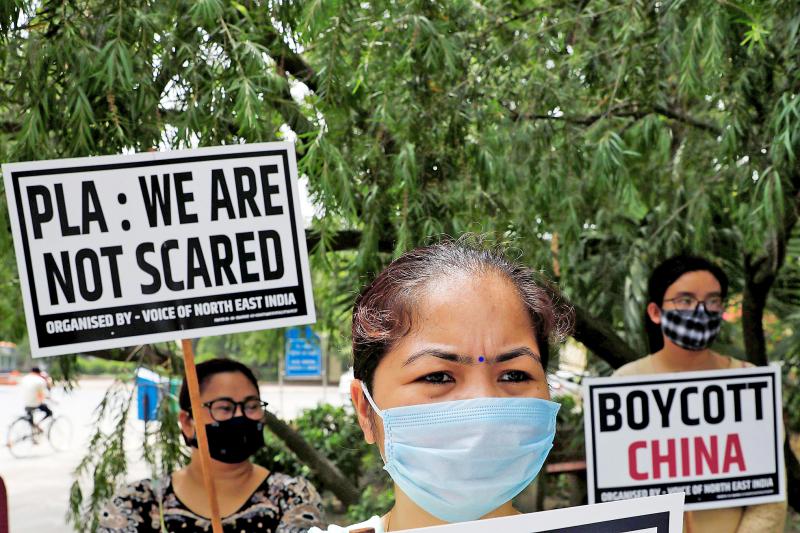India has told two state-run telecom firms to use locally made rather than Chinese telecom equipment to upgrade their mobile networks to 4G, a senior government source said on Thursday.
New Delhi’s move comes amid a backlash against companies from China after Chinese forces this week killed 20 Indian soldiers in a Himalayan border dispute.
The instruction is aimed at Chinese telecom gear makers Huawei Technologies Co (華為) and ZTE Inc (中興), the source said, after India last year announced an almost US$8 billion plan, some of which was earmarked for network upgrades, to help loss-making operators Bharat Sanchar Nigam Ltd (BSNL) and Mahanagar Telephone Nigam Ltd (MTNL).

Photo: Reuters
“Since that plan will be funded by public money they [BSNL and MTNL] should try to ensure they buy made-in-India equipment,” said the government source, who declined to be named as the order was not public.
The Indian Department of Telecommunications did not respond to a request for comment. The head of BSNL and MTNL did not answer calls or messages seeking comment.
Huawei declined to comment and ZTE, which potentially risks losing tens of millions of dollars in orders, did not respond to a request for comment. The Chinese embassy in Delhi also did not immediately respond to a request for comment.
Chinese companies face a public backlash after the worst clash since 1967 between China and India, where anti-Chinese sentiment is already strong.
Beijing has also come under fire over the coronavirus outbreak, with social media campaigns urging Indians to boycott Chinese goods.
The effective ban on the use of Chinese network gear could extend to private telecoms like Bharti Airtel Ltd and Vodafone Idea Ltd, which also use it in their networks.
“There will probably be some communication... maybe not a cease and desist, but a plea to avoid using Chinese equipment in core networks,” said a telecom industry source, who has worked closely with Chinese telecom equipment makers.
Any ban could increase costs for Indian telecoms, which would have to rely more on European firms like Nokia Oyj and Ericsson AB, as India has limited domestic expertise in telecom equipment manufacturing.

UNCERTAINTY: Innolux activated a stringent supply chain management mechanism, as it did during the COVID-19 pandemic, to ensure optimal inventory levels for customers Flat-panel display makers AUO Corp (友達) and Innolux Corp (群創) yesterday said that about 12 to 20 percent of their display business is at risk of potential US tariffs and that they would relocate production or shipment destinations to mitigate the levies’ effects. US tariffs would have a direct impact of US$200 million on AUO’s revenue, company chairman Paul Peng (彭雙浪) told reporters on the sidelines of the Touch Taiwan trade show in Taipei yesterday. That would make up about 12 percent of the company’s overall revenue. To cope with the tariff uncertainty, AUO plans to allocate its production to manufacturing facilities in

TAKING STOCK: A Taiwanese cookware firm in Vietnam urged customers to assess inventory or place orders early so shipments can reach the US while tariffs are paused Taiwanese businesses in Vietnam are exploring alternatives after the White House imposed a 46 percent import duty on Vietnamese goods, following US President Donald Trump’s announcement of “reciprocal” tariffs on the US’ trading partners. Lo Shih-liang (羅世良), chairman of Brico Industry Co (裕茂工業), a Taiwanese company that manufactures cast iron cookware and stove components in Vietnam, said that more than 40 percent of his business was tied to the US market, describing the constant US policy shifts as an emotional roller coaster. “I work during the day and stay up all night watching the news. I’ve been following US news until 3am

Taiwan will prioritize the development of silicon photonics by taking advantage of its strength in the semiconductor industry to build another shield to protect the local economy, National Development Council (NDC) Minister Paul Liu (劉鏡清) said yesterday. Speaking at a meeting of the legislature’s Economics Committee, Liu said Taiwan already has the artificial intelligence (AI) industry as a shield, after the semiconductor industry, to safeguard the country, and is looking at new unique fields to build more economic shields. While Taiwan will further strengthen its existing shields, over the longer term, the country is determined to focus on such potential segments as

COLLABORATION: Given Taiwan’s key position in global supply chains, the US firm is discussing strategies with local partners and clients to deal with global uncertainties Advanced Micro Devices Inc (AMD) yesterday said it is meeting with local ecosystem partners, including Taiwan Semiconductor Manufacturing Co (TSMC, 台積電), to discuss strategies, including long-term manufacturing, to navigate uncertainties such as US tariffs, as Taiwan occupies an important position in global supply chains. AMD chief executive officer Lisa Su (蘇姿丰) told reporters that Taiwan is an important part of the chip designer’s ecosystem and she is discussing with partners and customers in Taiwan to forge strong collaborations on different areas during this critical period. AMD has just become the first artificial-intelligence (AI) server chip customer of TSMC to utilize its advanced